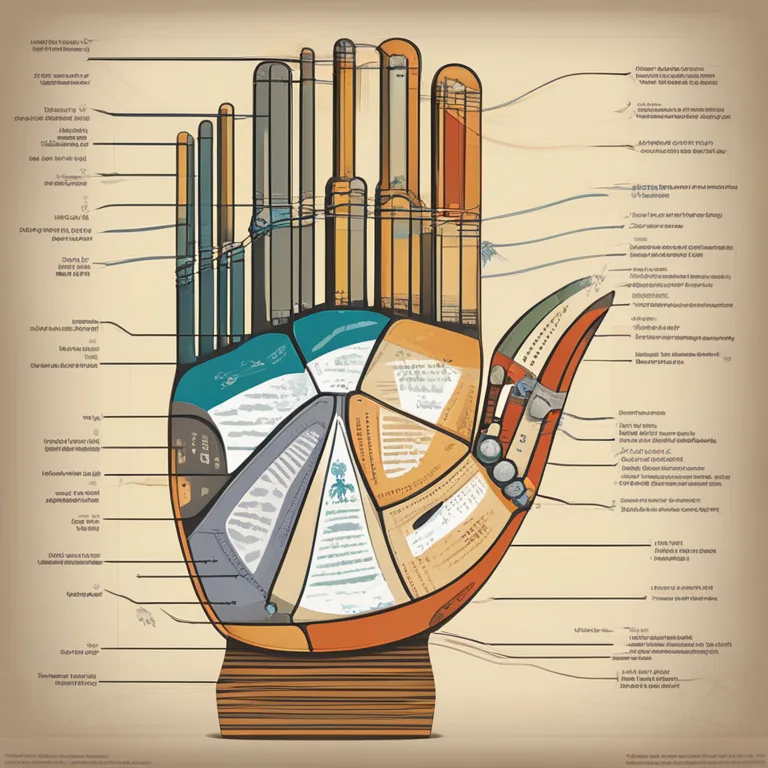
Can Palmistry Lines Evolve Over Time?
Delve into the dynamic nature of palm lines and their potential to reflect changes in life's journey, personal growth, and experiences.
article by Nora Pennington
Palmistry's Premise
Palmistry, also known as chiromancy, is an ancient practice rooted in various cultural traditions. It is predicated on the belief that an individual's palm contains lines and marks that can be interpreted to reveal insights about their personality, life choices, and future possibilities. A common question among enthusiasts and critics alike is whether the lines on our palms, those delicate patterns that some believe hold the map to our lives, can change over time. Interestingly, the field of palmistry itself stipulates that while certain fundamental lines are thought to be relatively more stable, other markings may indeed shift, evolve, or even emerge as we navigate different paths in our lives.

The Dynamic Lines of Life
Often, changes in palm lines are associated with corresponding changes in one’s life circumstances, behaviors, and emotional landscape. For example, the heart line, which some believe reflects emotional stability and love life, might alter with significant events such as new relationships or personal self-discovery. Similarly, the head line, indicative of intellectual pursuits and wisdom, could transform as one engages with new learning experiences or challenges. Therefore, the idea that our palm lines reflect our life stories aligns with the notion that as we grow and change, so might the lines on our palms.

Scientific Perspectives on Palmistry
While traditional palmists emphasize the metaphysical aspects of palm lines, science offers more material explanations. Dermatoglyphics, the study of the pattern of ridges on the skin of the fingers, palms, toes, and soles, suggests that our fingerprints and primary lines form during fetal development and are largely influenced by genetic factors. However, secondary lines and minor markings could indeed change with age or due to skin elasticity and other physiological factors. Furthermore, medical research has occasionally drawn attention to the correlation of certain palm line patterns with specific genetic conditions, giving some credence to the idea that changes in one's health might be mirrored in palm lines.

Observing the Change
For those curious about observing these transformations firsthand, it’s essential to approach the subject with careful scrutiny. Regularly examining and photographing your palms can serve as a record of any nuanced developments. Such changes may occur over prolonged periods and are often subtle, requiring a discerning eye to identify. Whether these alterations in one’s palm lines are seen as small wonders or simple quirks of fate, they nonetheless serve as a fascinating topic for exploration and discussion among novices and seasoned palm readers alike.

Skeptics and Believers
Critics of palmistry argue that any perceived changes in the lines are mere coincidences or generalities that could be applied broadly. Skeptics also point out that the belief in changing palm lines may lead individuals to assign undue significance to normal age-related changes or random events in life. Yet, for those who embrace the art, such transformations in the palm are seen as an extension of one’s personal growth and life experiences. It’s this debate that keeps palmistry an intriguing subject, balancing between mysticism and skepticism.
Published: 1/5/2024
Modified: 1/5/2024
More predictions
Come back here soon to learn more about yourself and your future


The Essence of Palmistry: A Guide to Hand Analysis
Delve into the world of palmistry, the ancient practice of interpreting palms to reveal personal insights and future paths.


The Changeable Nature of Palm Lines
Discover the factors influencing the ever-changing landscape of palm lines and what these modifications could signify in palmistry.


Hand Reading: The Essence of Palmistry
Delve into the basics of palmistry, the ancient art of hand reading, and learn how it aims to reveal personality traits and life paths.